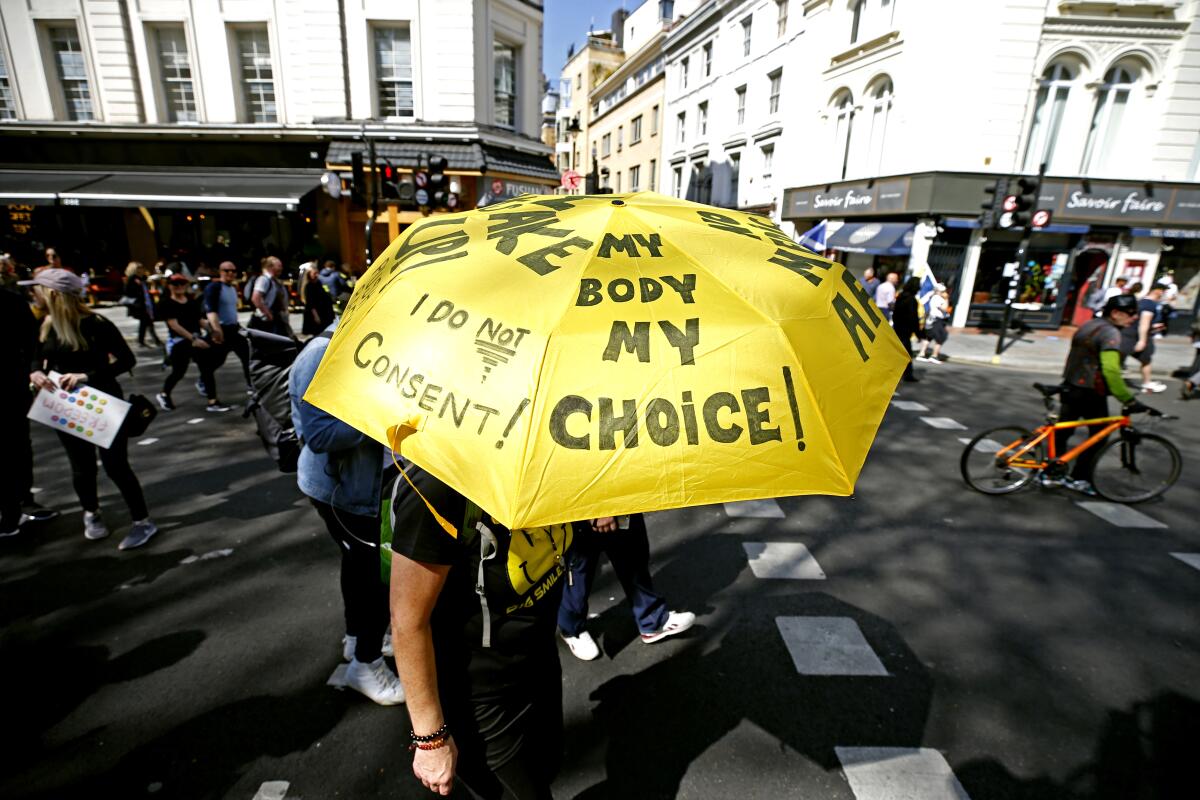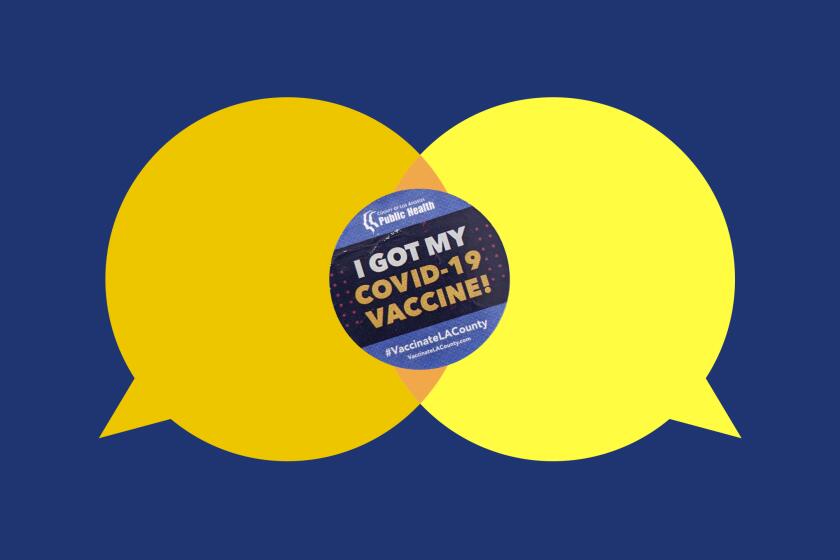Op-Ed: How ‘my body, my choice’ came to define the vaccine skepticism movement

- Share via
By now, nearly every adult in the U.S. who wants a COVID-19 vaccine has had the opportunity to receive at least a first shot. This also means that more than 100 million people do not want to be vaccinated — at least not yet.
Vaccine hesitancy often develops through preexisting beliefs that are centered on politics, religion, the economy, parenting and health. Language that has been co-opted from controversial debates, and is repurposed to express hesitation, ends up amplifying the vaccine skepticism.
Take one example: “My body, my choice” is the slogan of the “medical freedom” movement spreading across the country. If this slogan sounds familiar, that’s because it is. Vaccine-skeptical groups, including the Tennessee Coalition for Vaccine Choice and Texans for Medical Freedom, have lifted the language and syntax of reproductive choice to promote their own agendas.
For a Columbia University project on increasing COVID-19 vaccine confidence, we are examining online anti-vaccine rhetoric. Our preliminary analysis shows that a significant majority of such language is directly appropriated from other sources, ideas or movements that provoke strong feelings.
In tracking vaccine hesitancy in online forums such as Facebook groups, parenting sites and Reddit subgroups, we’ve found a complex mosaic of conflicting feelings and ideas that do not neatly fall along demographic or political fault lines. But one constant is the use of language that has been repurposed from other divisive debates.
Families invoke “natural parenting” in worrying about the long-term effects on their children of a new vaccination technology. Political activists speak of “medical freedoms” and of personal rights to choose what goes into their bodies. Freethinkers who distrust authority figures in government or academia are inclined to “do their own research” or discuss conspiracy theories.
The religious bring up the idea that some vaccine ingredients may violate Jewish, Muslim or Hindu dietary restrictions. Those who have had an uneasy relationship with the medical establishment in the past — whether their problems were ignored, undertreated or mistreated — can be reluctant to trust the safety of vaccines.
Yet in almost all cases, the language, syntax and rhetoric used to express hesitancy has been borrowed from other debates, usually over divisive political issues. The widespread familiarity of the language to large numbers of people makes the message all the more powerful.
You want them to get vaccinated. They don’t. Now what? Tips from experts to have a conversation that could possibly change their mind.
To prevent many more people from dying, and to accelerate a return to normalcy, COVID-19 vaccine hesitancy will need to be thoroughly understood and addressed on a massive scale.
To understand the role of language in vaccine hesitancy, our project is monitoring the ongoing conversation on social media through millions of aggregated tweets, posts and comments. We are using data-science tools such as machine learning to reveal language patterns that mirror language used in other contentious debates: abortion rights, alternative medicine, free speech, religious freedom.
Borrowed rhetoric has always shaped our attitudes about illness. Writing in the 1980s, Susan Sontag powerfully argued that metaphors distort our experiences of suffering from illnesses such as cancer, tuberculosis and AIDS. The use of metaphors is affecting how people view COVID-19. Online “vaccine victimhood” groups are aggregating stories, real and imaginary, of vaccination gone wrong.
Disturbing images of supposed side effects proliferate. Funds are raised for those suffering from undetermined ailments, believed to be caused by the vaccine. Vigils are held. There is talk of accountability, retribution and class action. The common refrain adopted by vaccine victims? “Me Too.” Familiarity breeds fondness for the new message.
While a concern about vaccine safety is one reason for hesitancy, the chatter our research team has been monitoring online has shown that it is by no means the only — or even the most common — factor. As a result, more scientific information on the safety or efficacy of the vaccine will not be enough to persuade many vaccine hesitators to get COVID shots, even when such information comes from trusted sources such as celebrities or community leaders.
To help change a deep-seated reluctance to become vaccinated, we must understand the language of this anxiety — how people think and communicate. If we treat language as data — similar to the way we use epidemiological data to describe the epidemic itself — we can develop precise public health messaging to support vaccination.
What might this messaging look like? We will need precision-tailored messaging strategies. We can oppose anti-vaccine language by turning its own syntax, word choice and emotive strategies against it.
In countering “medical freedom” discourse, for example, we need to employ the language of rights: “It is your right to get a vaccine.” In essence, stand up and don’t let anyone deprive you of this right. For individualists who might be swayed by echoes of the 2nd Amendment: “Only you can protect yourself and your family.” For freethinkers who do their own research: “No one else convinced me; I convinced myself to get the vaccine.”
It may seem counterintuitive, but public health messaging informed by the language of vaccine hesitancy may be the most effective way to turn skeptics into vaccine adopters.
Rishi Goyal, Arden Hegele and Dennis Tenen are researchers leading a multiyear project, “Increasing COVID-19 Vaccine Confidence,” run by Columbia World Projects at Columbia University.
More to Read
A cure for the common opinion
Get thought-provoking perspectives with our weekly newsletter.
You may occasionally receive promotional content from the Los Angeles Times.











